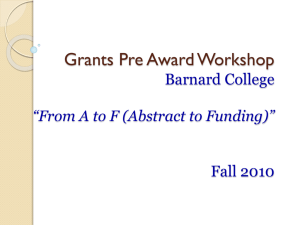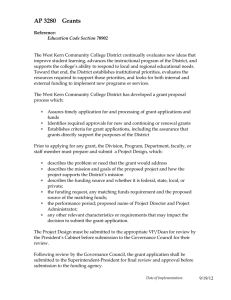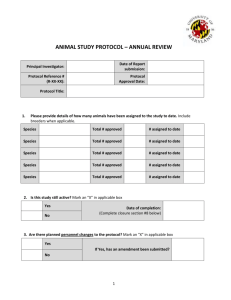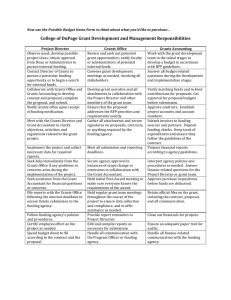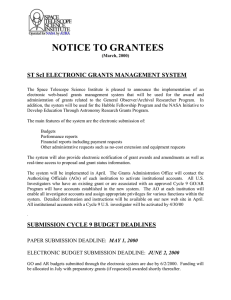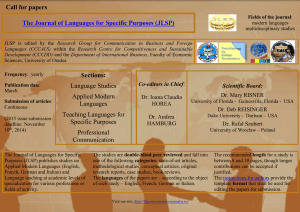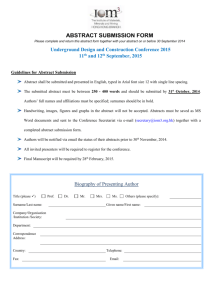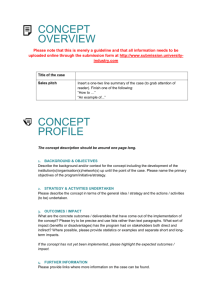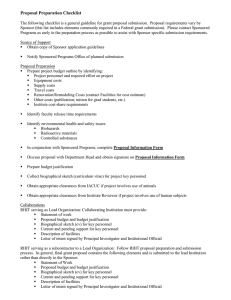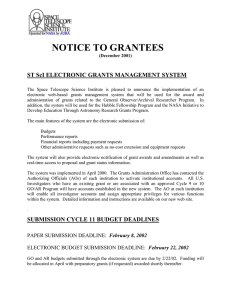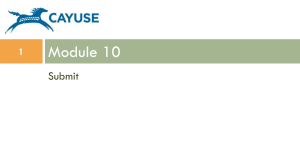A Guide to Proposal Development and Preparation Sierra Nevada
advertisement
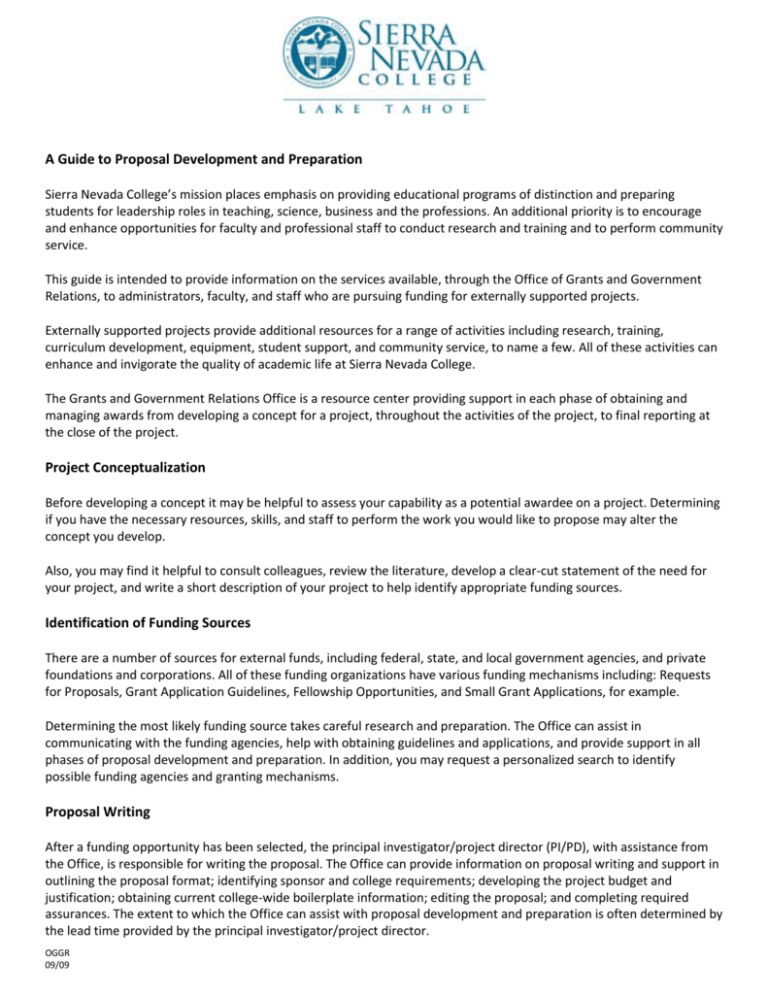
A Guide to Proposal Development and Preparation Sierra Nevada College’s mission places emphasis on providing educational programs of distinction and preparing students for leadership roles in teaching, science, business and the professions. An additional priority is to encourage and enhance opportunities for faculty and professional staff to conduct research and training and to perform community service. This guide is intended to provide information on the services available, through the Office of Grants and Government Relations, to administrators, faculty, and staff who are pursuing funding for externally supported projects. Externally supported projects provide additional resources for a range of activities including research, training, curriculum development, equipment, student support, and community service, to name a few. All of these activities can enhance and invigorate the quality of academic life at Sierra Nevada College. The Grants and Government Relations Office is a resource center providing support in each phase of obtaining and managing awards from developing a concept for a project, throughout the activities of the project, to final reporting at the close of the project. Project Conceptualization Before developing a concept it may be helpful to assess your capability as a potential awardee on a project. Determining if you have the necessary resources, skills, and staff to perform the work you would like to propose may alter the concept you develop. Also, you may find it helpful to consult colleagues, review the literature, develop a clear-cut statement of the need for your project, and write a short description of your project to help identify appropriate funding sources. Identification of Funding Sources There are a number of sources for external funds, including federal, state, and local government agencies, and private foundations and corporations. All of these funding organizations have various funding mechanisms including: Requests for Proposals, Grant Application Guidelines, Fellowship Opportunities, and Small Grant Applications, for example. Determining the most likely funding source takes careful research and preparation. The Office can assist in communicating with the funding agencies, help with obtaining guidelines and applications, and provide support in all phases of proposal development and preparation. In addition, you may request a personalized search to identify possible funding agencies and granting mechanisms. Proposal Writing After a funding opportunity has been selected, the principal investigator/project director (PI/PD), with assistance from the Office, is responsible for writing the proposal. The Office can provide information on proposal writing and support in outlining the proposal format; identifying sponsor and college requirements; developing the project budget and justification; obtaining current college-wide boilerplate information; editing the proposal; and completing required assurances. The extent to which the Office can assist with proposal development and preparation is often determined by the lead time provided by the principal investigator/project director. OGGR 09/09 Early in the proposal development process, discuss your project with your department chair, as appropriate, to enlist approval and support for the project. Release time, space, cost sharing, and other center or institutional issues should be clarified early in the proposal development process in order to avoid delays in proposal submission. Each funding agency has its own set of guidelines for the proposal narrative section. However, there are certain general characteristics that apply to most proposals submitted for external funding: State clearly the need for, and the objectives of, the project. Match the stated priorities of the funding agency as closely as possible. Make clear the ways in which your project is innovative, necessary, timely, and significant. Clearly describe your project and include timelines, charts, and graphs where appropriate. Collaborate with other individuals, agencies, or organizations whenever possible. Carefully follow all instructions from the funding agency, including page limitations, deadlines, and review criteria. Include, if requested, a current, clean copy of your curriculum vitae and biographical sketches of other key personnel. Determine if you will need approval for projects involving human subjects, animal subjects, copyrights, etc., in consultation with the Office, well before the agency deadline. It is sometimes helpful to have a colleague or the Office review your draft proposal before a final version is prepared. This helps to ensure clarity and completeness. Proposal Budget A proposal budget and line item justification are prepared in conjunction with the proposal narrative. Many agencies have specific budget restrictions and guidelines, as well as forms to be used with the proposal submission. The Office can supply information regarding personnel, fringe benefits, use of consultants, equipment, facilities and administrative (indirect) costs for your proposal. The Office should be contacted early in the proposal development stage for help in preparing a proposal budget. Proposal Review and Approval As noted above, it is helpful to consult with your department chair and the Office regarding institutional issues early in the process of developing your proposal. This will facilitate submission of the proposal before the agency deadline. The final copy of the proposal, along with any attachments and the completed Proposal Approval Record (which is available in the Office) is then forwarded to the Grants and Government Relations Office for review and signature, and continuation of the approval process to the Office of Development and Executive Office. Proposal Submission Every effort should be made to submit a proposal, with the appropriate approvals, to the Office at least five days prior to the funding agency’s due date. However, it is always best to check in advance of the deadlines for any exceptions to this time frame. OGGR 09/09 Planning and Preparation Time The time from proposal preparation and submission to award can be as long as six to nine months. The process can take longer than expected. If you plan to use the resources of the Office, please contact the office early in the process of proposal development. The Grants and Government Relations Office looks forward to collaborating with you in the development of your proposal. Please feel free to call (X7459) or visit the Office, located on the second floor of the Prim Library. OGGR 09/09

